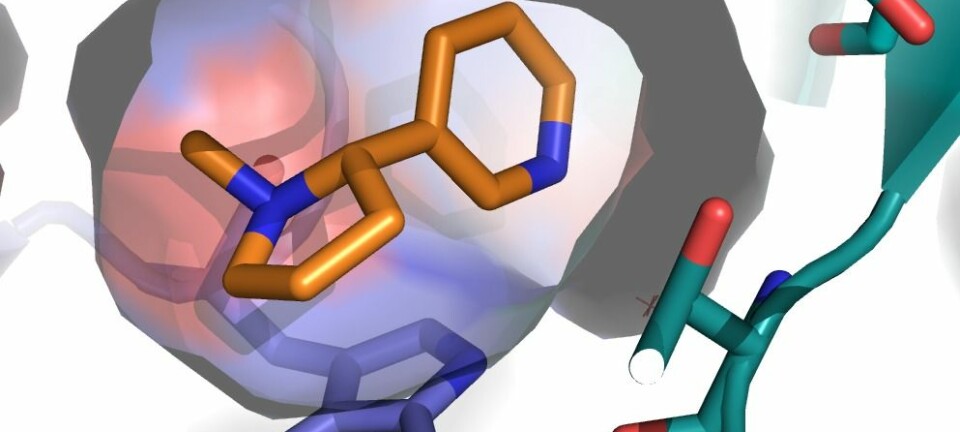
Blood test can unveil Alzheimer's
A Danish biotech firm has developed a new test which can detect, from a bog standard blood sample, whether the person concerned has Alzheimer's disease. The test can even reveal the disease in its early stages.
Researchers at the Danish biotech firm Nordic Bioscience have developed a new test for early diagnosis of Alzheimer’s disease.
The test can measure whether the blood contains fragments of a special protein, known as tau, of which Alzheimer’s sufferers have larger quantities than people without the disease.
"We are the first in the world to have found a method of diagnosing Alzheimer's on the basis of a harmless blood sample," says the firm's development director Morten Karsda. "The test enables sufferers to be diagnosed considerably earlier in the process than previously possible and can also reveal how rapidly the disease is developing."
Results presented at a conference
The new test is still at the trial stage, and has thus far only been carried out on mice which have been given Alzheimer's, but the results have been good. The researchers have also tested the procedure on 33 Alzheimer's patients and 81 healthy control individuals, getting the diagnosis right in 80 percent of cases.
New knowledge about the disease is the first step to finding something that works on the diseases.
Morten Karsdal
Although the results have not been published, Morten Karsdal was recently invited to present the test at the prestigious Alzheimer's Association International Conference on Alzheimer's Disease (AAICAD), held in Paris in July.
The results are so promising that the firm will continue work on the test.
Danish professor positive
The new blood test has also been favourably received by the head of the Danish Dementia Research Centre, Gunhild Valdemar, who is also a Professor at the Department of Neurology, Psychiatry and Sensory Sciences at the University of Copenhagen.
She has skimmed through Nordic Bioscience's results and believes the test has the potential to become a good tool to supplement other methods for diagnosing the disease.
The pharmaceutical industry will find the test useful in developing drugs tailored to specific patient groups because it will be possible quickly to determine whether or not a given drug has an effect.
Morten Karsdal
"Seen in light of the fact that we do not have a test which can diagnose Alzheimer's early and with certainty, this test is first rate in theory. I do not expect it to be 100 percent certain, although a test based on an ordinary blood sample is always potentially promising, she says.
Alzheimer's fingerprint
Tau is a protein that is present in the brain and it has long been known that the Alzheimer's patients have slightly elevated quantities of tau protein. This is why the diagnosis has always been made by measuring a person’s tau protein level.
However, tau proteins cannot penetrate the brain-blood barrier, which keeps the brain tissue and the spinal cord separate from the blood. So until now it has only been possible the measure tau levels by inserting a hypodermic needle into the spinal cord to take a sample of the cerebrospinal fluid.
The clever thing about the new test is that instead of focusing on intact tau protein, it measures the quantity of tau protein fragments.
Alzheimer’s cuts through the proteins
Alzheimer's disease chops up whole tau proteins in a very special way during its destruction of the brain tissue, and unlike whole tau proteins, the fragments are able to penetrate the brain-blood barrier and escape into the bloodstream.
"The protein fragments accommodate more information than the whole proteins because they result from the disease's destruction of the brain tissue. The fragmented tau proteins can be seen as Alzheimer's unique fingerprint, which the test is able to recognise,” says Karsdal.
The researchers at Nordic Bioscience carried out an experiment in which they measured the quantity of tau protein fragments in mice which were in the early stages of developing the disease, before they had developed symptoms.
"We found that the sick mice had more or less the same quantity of whole tau as healthy mice, while the quantity of fragments was 15 times higher. This shows that the fragments were associated with disease," Karsdal says.
Ineffective treatment can be due to late diagnosis
At present, Alzheimer's disease can neither be cured, stopped nor slowed by existing drugs.
One possible explanation as to why the pharmaceutical companies' products have not had a good effect is that treatment has been initiated too late. The new trend is to treat earlier for Alzheimer's and to keep an eye on whether the patients' condition actually improves.
"An early diagnosis is extremely important. The new test could become an effective way of finding those patients who would benefit from the various types of treatment and to help doctors select the medication best suited to each individual patient," Karsdal says.
By taking a series of blood samples over a period of weeks one can see whether the amount of tau protein grows, and thus form an impression of how aggressive the disease is in the patient.
"In the same way, it will be possible to use the test to determine whether a drug is having a beneficial effect on the disease, whether it can inhibit or perhaps even stop development of the disease. If one drug has no effect, another can be tried," says Karsdal.
Further studies needed
In the opinion of Professor Gunhild Valdemar of the Danish Dementia Research Centre, the firm now has a solid basis for proceeding with further studies to check whether the test really can detect Alzheimer's at an early stage.
"It is necessary to test hundreds of patients and follow their progress for some years to see if patients who react positively to the test actually do develop Alzheimer's disease to a larger extent than those who react negatively," she says.
The next step will be to document that the test does not show a positive result for other types of dementia, for example Lewy Body Dementia or Pick's disease (frontotemporal dementia). It will therefore be some years before we know for certain that the test can be launched on the market," Valdemar points out.
Read the article in Danish at videnskab.dk
Translated by: Hugh Matthews
External links
- Morten Karsdal's profile, Nordic Bioscience
- The Danish Alzheimer's Association
- Tau protein (Wikipedia)
- The AAIC Alzheimer's conference





